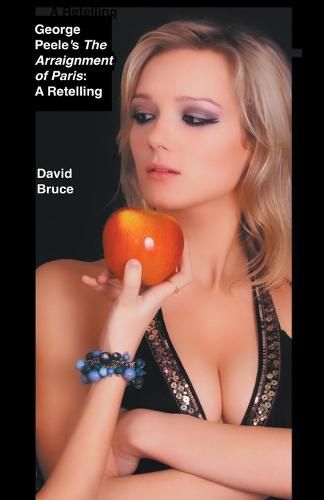Readings Newsletter
Become a Readings Member to make your shopping experience even easier.
Sign in or sign up for free!
You’re not far away from qualifying for FREE standard shipping within Australia
You’ve qualified for FREE standard shipping within Australia
The cart is loading…






This title is printed to order. This book may have been self-published. If so, we cannot guarantee the quality of the content. In the main most books will have gone through the editing process however some may not. We therefore suggest that you be aware of this before ordering this book. If in doubt check either the author or publisher’s details as we are unable to accept any returns unless they are faulty. Please contact us if you have any questions.
This is an easy-to-read retelling of Elizabethan playwright George Peele’s THE ARRAIGNMENT OF PARIS.
Inscribed on a golden apple is the phrase For the fairest, written in written in Latin (in Peele’s play). Because Latin is a language that indicates masculine and feminine in certain words, and since fairest has a feminine ending, the apple is really inscribed for the fairest female.
Three goddesses claim the apple, meaning that each of the three goddesses thinks that she is the fairest, or most beautiful.
The three goddesses get Paris, a shepherd who is also a Prince of Troy, to judge who should be awarded the golden apple.
After Paris makes his decision, one goddess is happy, but two goddesses are very unhappy. Those two goddesses decide that Paris was biased and that therefore his decision should be overturned.
Jupiter and some other male gods sit in a Council of Judges and hold a trial to decide whether Paris was biased and to decide which goddess should be awarded the golden apple.
Do you know a language other than English? If you do, I give you permission to translate this book, copyright your translation, publish or self-publish it, and keep all the royalties for yourself. (Do give me credit, of course, for the original retelling.)
I would like to see my retellings of classic literature used in schools, so I give permission to the country of Finland (and all other countries) to give copies of this book to all students forever. I also give permission to the state of Texas (and all other states) to give copies of this book to all students forever. I also give permission to all teachers to give copies of this book to all students forever.
Teachers need not actually teach my retellings. Teachers are welcome to give students copies of my eBooks as background material. For example, if they are teaching Homer’s Iliad and Odyssey, teachers are welcome to give students copies of my Virgil’s Aeneid: A Retelling in Prose and tell students, Here’s another ancient epic you may want to read in your spare time.
$9.00 standard shipping within Australia
FREE standard shipping within Australia for orders over $100.00
Express & International shipping calculated at checkout
This title is printed to order. This book may have been self-published. If so, we cannot guarantee the quality of the content. In the main most books will have gone through the editing process however some may not. We therefore suggest that you be aware of this before ordering this book. If in doubt check either the author or publisher’s details as we are unable to accept any returns unless they are faulty. Please contact us if you have any questions.
This is an easy-to-read retelling of Elizabethan playwright George Peele’s THE ARRAIGNMENT OF PARIS.
Inscribed on a golden apple is the phrase For the fairest, written in written in Latin (in Peele’s play). Because Latin is a language that indicates masculine and feminine in certain words, and since fairest has a feminine ending, the apple is really inscribed for the fairest female.
Three goddesses claim the apple, meaning that each of the three goddesses thinks that she is the fairest, or most beautiful.
The three goddesses get Paris, a shepherd who is also a Prince of Troy, to judge who should be awarded the golden apple.
After Paris makes his decision, one goddess is happy, but two goddesses are very unhappy. Those two goddesses decide that Paris was biased and that therefore his decision should be overturned.
Jupiter and some other male gods sit in a Council of Judges and hold a trial to decide whether Paris was biased and to decide which goddess should be awarded the golden apple.
Do you know a language other than English? If you do, I give you permission to translate this book, copyright your translation, publish or self-publish it, and keep all the royalties for yourself. (Do give me credit, of course, for the original retelling.)
I would like to see my retellings of classic literature used in schools, so I give permission to the country of Finland (and all other countries) to give copies of this book to all students forever. I also give permission to the state of Texas (and all other states) to give copies of this book to all students forever. I also give permission to all teachers to give copies of this book to all students forever.
Teachers need not actually teach my retellings. Teachers are welcome to give students copies of my eBooks as background material. For example, if they are teaching Homer’s Iliad and Odyssey, teachers are welcome to give students copies of my Virgil’s Aeneid: A Retelling in Prose and tell students, Here’s another ancient epic you may want to read in your spare time.